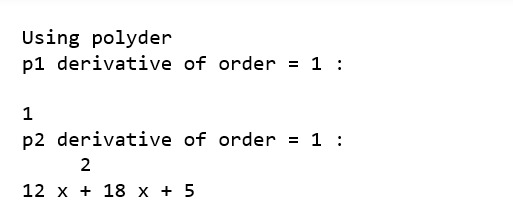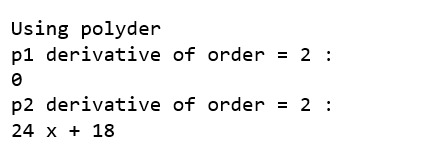numpy.polyder(p,m)方法計算具有指定順序的多項式的導數。
參數:
p:[array_like or poly1D]the polynomial coefficients are given in decreasing order of powers. If the second parameter (root) is set to True then array values are the roots of the polynomial equation.
For example:poly1d(3, 2, 6) = 3x2 + 2x + 6m:[int, optional] Order of differentiation.
返回:Derivative of polynomial.
代碼:解釋polyder()的Python代碼
# Python code explaining
# numpy.polyder()
# importing libraries
import numpy as np
import pandas as pd
# Constructing polynomial
p1 = np.poly1d([1, 2])
p2 = np.poly1d([4, 9, 5, 4])
print ("P1:", p1)
print ("\n p2:\n", p2) 
# Solve for x = 2
print ("\n\np1 at x = 2:", p1(2))
print ("p2 at x = 2:", p2(2)) 
a = np.polyder(p1, 1)
b = np.polyder(p2, 1)
print ("\n\nUsing polyder")
print ("p1 derivative of order = 1:\n", a)
print ("p2 derivative of order = 1:\n", b) 
a = np.polyder(p1, 2)
b = np.polyder(p2, 2)
print ("\n\nUsing polyder")
print ("p1 derivative of order = 2:", a)
print ("p2 derivative of order = 2:", b)
相關用法
注:本文由純淨天空篩選整理自Mohit Gupta_OMG 大神的英文原創作品 numpy.polyder() in Python。非經特殊聲明,原始代碼版權歸原作者所有,本譯文未經允許或授權,請勿轉載或複製。
